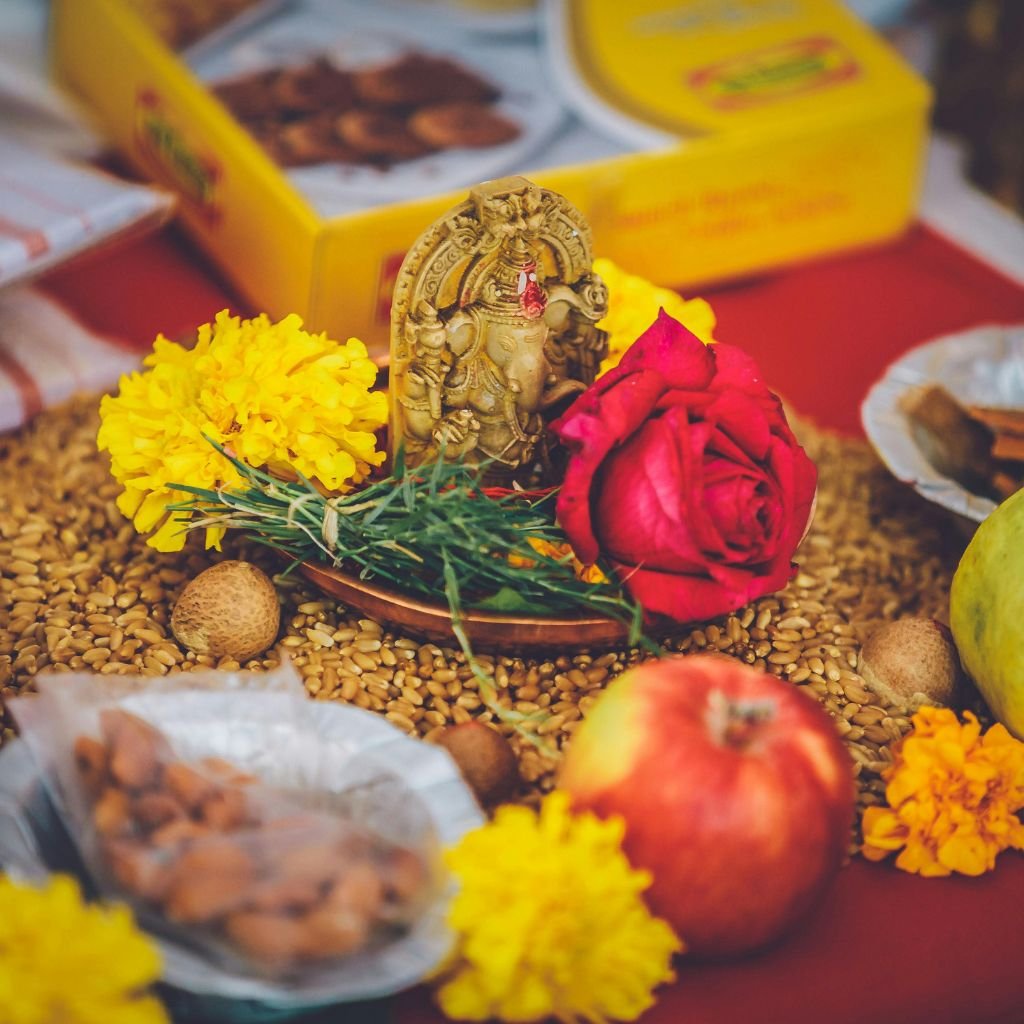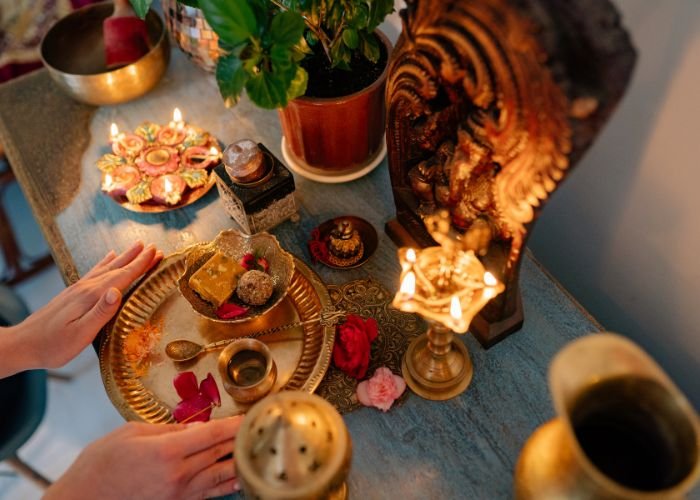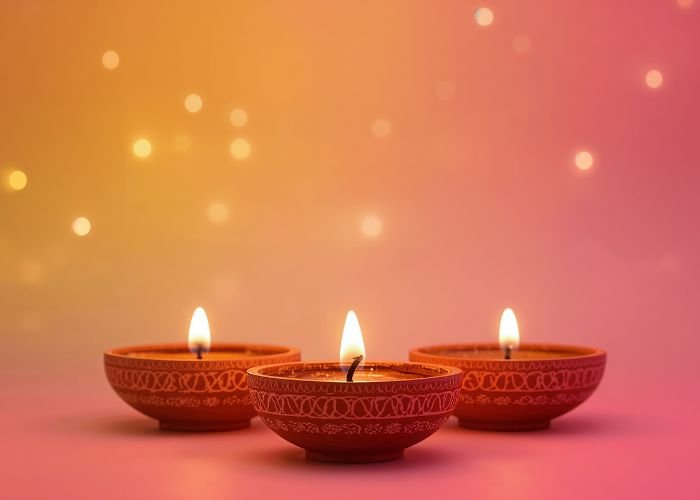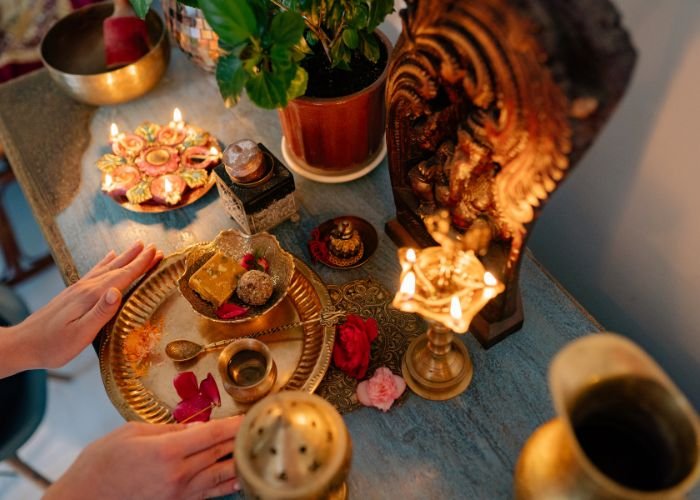

Puja Vidhi
Puja Vidhi refers to the sacred process of performing a Puja (worship) with devotion and proper rituals. It includes offering flowers, lighting diyas, chanting mantras, and praying to deities for peace, prosperity, and positivity. Whether it’s a daily pooja vidhi at home or a special festival like Laxmi Puja Vidhi, Dhanteras Puja Vidhi or Ganesh Puja Vidhi, following the right steps with faith helps connect the devotee to divine energy and bring spiritual harmony into life.
Define Puja and Puja Vidhi
The word Puja (or Pooja) in Sanatana Dharma means an act of showing prayers, and rituals. It’s derived from the Sanskrit word “Pūj”, meaning to honor or worship. Puja Vidhi refers to the step-by-step process or method of performing Puja, which includes offering flowers, incense, water, food, and chanting sacred Puja Mantras. Puja should be performed daily twice a day or on special occasions such as Diwali Laxmi Puja Vidhi, Ganesh Puja Vidhi, or Janmashtami Puja Vidhi, each having its unique rituals and significance.

When to Do Puja or Puja Vidhi?
The best time for Puja is Brahma Muhurta (early morning, 4–6 AM), when the environment is pure and quiet. Evening Sandhya Puja is also auspicious for daily prayers. Special festivals like Diwali, Janmashtami, Ganesh Chaturthi, and Navratri have specific Puja Muhurats (shubh muhurat) determined by Hindu Panchang.
How Many Times Should You Do Puja at Home in a Day?
Puja should be performed twice a day—morning and evening. However, even one heartfelt daily puja brings divine blessings if done with focus and purity.

How to Do Puja at Home?
Performing Puja at home purifies the environment and helps connect with divine energy. Here’s a simple Puja Vidhi you can follow daily:
Take a bath and wear clean clothes.
Clean the Puja space and light a diya (lamp).
Place the idols or photos of your deities facing the east or west direction.
Offer flowers, incense sticks, and water.
Chant Puja Mantras or simple bhajans.
Meditate for a few minutes after the Puja.
This daily pooja vidhi helps maintain peace, positivity, and devotion in your home.
Direction of Puja Vidhi
The direction of the Puja plays an important role in Hindu rituals.
The deity should ideally face east or west.
The devotee should face north or east while performing the Puja.
Keep your Puja altar (Mandir) clean and decorated with flowers and lamps.
Types of Puja & Puja Vidhi

In every Hindu puja, different deities are worshipped with unique rituals. For example, Lord Ganesha is invoked for beginnings, Goddess Lakshmi for prosperity, and Lord Shiva for strength and protection.

Reciting a Chalisa, such as the Hanuman Chalisa, is an integral part of a pooja ceremony. It helps devotees focus their mind and invite divine blessings through rhythmic verses.
Mantra for Puja Vidhi
Chanting Puja Mantras purifies the mind and surroundings. Common Poojan Mantras include:
Om Gan Ganapataye Namah – for Lord Ganesha
Om Mahalaxmi Namah – for Goddess Laxmi
Om Namo Bhagavate Vasudevaya – for Lord Krishna
Importance of Puja Vidhi
Puja Vidhi connects us with the Divine through devotion and discipline. Performing regular Puja:
Brings peace, harmony, and prosperity
Removes negative energies
Strengthens spiritual consciousness.
Simple Puja Vidhi for Daily Puja
Here’s a step-by-step Daily Puja Vidhi for beginners:
Wash your hands and sit facing east.
Offer water (achman) to purify yourself.
Light a lamp and incense.
Offer flowers, fruits, and sweets.
Recite Sampurn Puja Mantras or chant Om Namah Shivaya / Om Namo Narayanaya.
Bow down in prayer and seek blessings.

/**/
FAQs - Puja Vidhi
What is the meaning of Puja?
Puja means worship — a spiritual practice of expressing devotion and gratitude to God through rituals, offerings, and prayers.
Can Puja be done without a priest?
Yes, a simple Puja Vidhi can be performed at home by anyone with devotion and purity.
What items are needed for Puja (Pujan Samagri)?
Basic items include diya, flowers, incense, rice, sandalwood paste, fruits, and water.
Where can I find complete Puja Vidhi PDFs?
You can refer to resources like संपूर्ण पूजन एवं यज्ञ विधि PDF, पूजा विधि मंत्र सहित PDF, on sanatan journey through our Puja Vidhi section for step-by-step guides.


